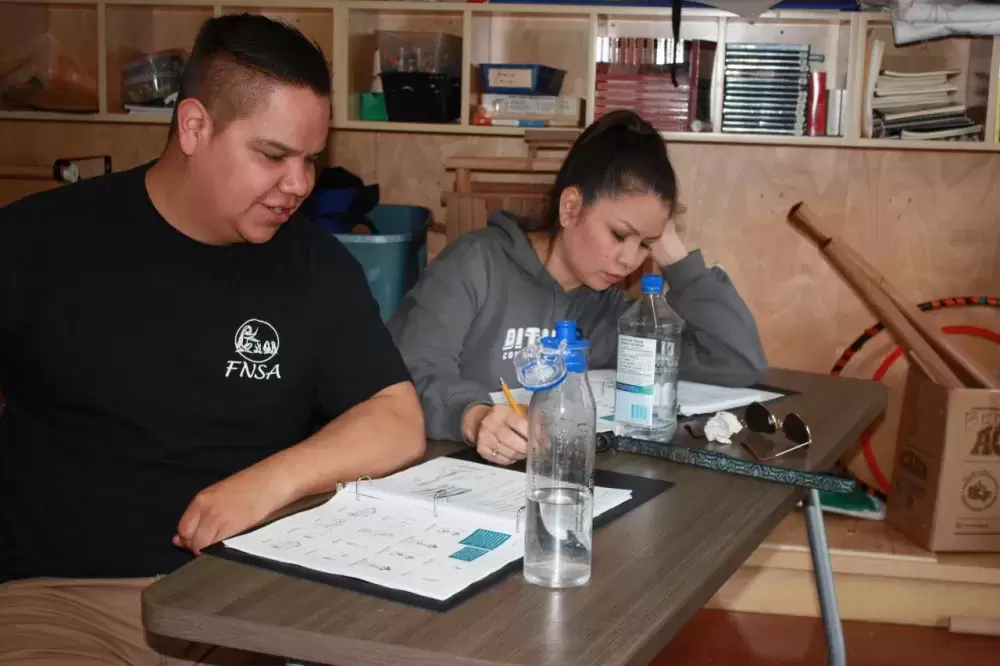Ditidaht educators have come up with a unique plan to preserve and teach the Ditidaht language within the community, and it’s proving to be very popular with the people.
Adults of all ages are attending weekly classes in an effort to earn a university college credit. Attendance at a new Ditidaht language program has surpassed what educators expected by three-fold.
Community leaders have made preservation of the Ditidaht language a priority. The Ditidaht people feel that this is important work due to the fact very few fluent speakers left.
Elder Fran Tate named five fluent speakers that she could think of: Mike Thompson, Bernice Touchie, Dorothy Shepherd, Amelia Robinson and Christine Edgar. There are a few semi-fluent speakers and there are dozens of people willing to learn.
According to Ditidaht Community School (DCS) teacher Dave Mason, the classes began in March for adults in the community. Non-native school teachers are also taking part in the classes.
Adult Language classes take place weekly at the Ditidaht Community School, with one ‘intensive’ week of classes followed by three weeks of one class per week where the students practise what they’ve learned.
The class is taught by DCS high school teacher Dave Mason, UVic Linguist Professor Adam Werle, and fluent Ditidaht elder Dorothy Shepherd.
Mason says that Werle is not available every week and so they came up with the unique class schedule where students take the classes Monday to Wednesday evenings once a month when Werle is in the community. While in class they work through newly-created Ditidaht language workbooks and practise conversational Ditidaht language through role playing.
Those that successfully complete the program will earn one university credit at UVic for Ling 159. The students are enthusiastic about learning the language.
There is a mix of elders, young adults and teachers. Some of the young adults work in the school or with pre-schoolers and teach what language they know to the children. For them, it is especially important develop language fluency in the community.
And for the fluent and semi-fluent adults, learning to read and write the Ditidaht language with all of its special characters is equally important as they help to create language materials for future generations.
In addition to learning to speak the language, students also learn about Nuu-chah-nulth culture. For example in lesson 3.1, students learn about introducing themselves to others and why it is important to include information about ancestry.
“In Ditidaht and Pacheedaht culture, introducing oneself mostly involves talking about one’s ancestors, where they came from, and who they are related to,” says the workbook. The reason given is that for Nuu-chah-nulth people, ancestry is an important part of our identity and also because people are interested in how they might be related.
Elder Fran Tate said she is semi-fluent in the Ditidaht language and it was her first language. She said she didn’t learn English until she went to residential school. Looking around at the young people learning the Ditidaht language she said, “I guess for some it’s like how learning English in school was for us.”
DCS high school teacher Dave Mason said they expected 10 students when they started the program in early March but they’ve had up to 34 adults showing up for the classes.
Adam Werle is a University of Victoria linguistics professor who has worked with other Nuu-chah-nulth nations. UVic is partnering with DCS to offer the language class and develop text book materials that will be made available for the next class of people wishing to learn the Ditidaht dialect of the Nuu-chah-nulth language. Mason says they hope to collaborate with their Pacheedaht neighbors who speak the same dialect.
“We believe we are the first to take the approach of combining a teacher and a linguist to deliver adult language classes,” Mason said.
As the course progresses, the instructors develop printed learning materials that will be compiled into teaching aides to be made available online next semester for future learners.







